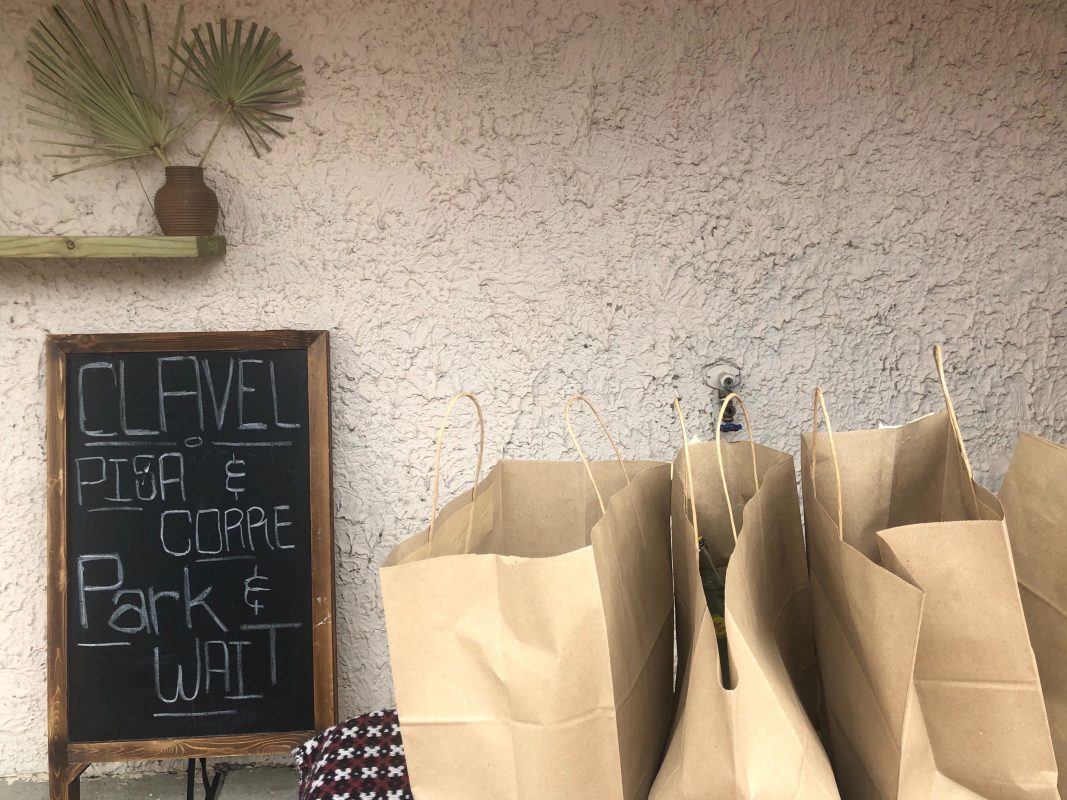
Like many area restaurateurs, Clavel co-owners Lane Harlan and Carlos Raba have recently reinvented the business model at their James Beard-nominated taqueria with carryout and curbside pickup due to the COVID crisis. They’ve even gone so far as to give their grab-and-go business a new name, Pisa & Corre, which was inspired by the convenience stores in Raba’s hometown of Sinaloa, Mexico.
“I used to go to a little drive-thru market in my little city in Mexico and it was called Pisa y Corre, which translates to the Stop and Run,” Raba says. “You could go buy beer and groceries and drive through. So I said, ‘Why don’t we do tacos kits?’ People need a meal that not only is affordable, but filling.”
In keeping with this idea, the team also decided to start serving burritos. “You can eat half one day and half another,” Raba adds. “They have a lot of flavor, they are as good the next day, and they make people smile. With Pisa & Corre, we’ve created a totally different business. We are innovators fighting for Baltimore and our community, and making the best of it with what we can.”
It seems as though you’re doing really well with your new carryout model and selling out each week. How’s it going?
Lane Harlan: The first week was traumatic. We were open for brunch with a skeleton crew the day before—we knew it was coming. On March 16, when Governor Hogan closed restaurants and bars, we literally spent 24 hours brainstorming this new business model that we call Pisa & Corre. We didn’t have a website built yet, we put a menu online and people could call in their orders, but you can only process as fast as the speed of answering the phone and confirming payment and then people were showing up without having ordered.
We thought our online website would fix everything, but it created new obstacles. It allowed everyone to order at the same time, which created a backlog and people were having to wait two-and-a-half hours. That single day ended up being the most amount of sales we’ve ever done, and that was with less than 10 people working. We had to apologize to a lot of people that first night. When things have gotten mixed up, we’ve offered refunds, and most people declined to take them.
So, what is working for you?
LH: What is working is that we’ve increased our prices by 20 percent in order to send weekly money to our non-working staff—and not one customer has complained. The tip pool is distributed evenly to nearly everyone, including the working staff on the days that they aren’t working. We laid off people who chose to be laid off so they could apply for unemployment. [Some are opting] out of the tip pool to provide for the people who need it the most—if you’re benefiting from the stimulus, you might not need the tip pool money.
No one should profit during this crisis. Individuals and the businesses themselves shouldn’t be profiting. The people in need are our number-one concern, and we will be endlessly creative about how to keep these people paying their bills and keep milk in their fridge. The speed of the government is slow, and people don’t have time to wait for money to feed their families.
“We are innovators fighting for Baltimore and our community and making the best of it with what we can.”
I noticed you’ve been selling T-shirts, too.
LH: People are buying merchandise like never before—they know it’s going to a tip pool. I went to a local screen printer and spent money on hundreds of shirts and sold out. People truly care and keep buying them.
So, are you making the math work in terms of being able to make ends meet?
LH: The numbers are working because we have higher averages for what people are spending and buying in bulk, and we have less staff. For example, we’re selling six margaritas in bulk at a time. It’s an amazing hustle that doesn’t feel super sustainable. We can afford our payroll and people are being paid right now at least what they were making before, but we don’t know how long this is sustainable. We are in serious survival mode.
How else are you supporting your staff?
LH: We just hosted a back of house meeting with a translator with Maryland CASA. We want to help them get resources, learn how to get unemployment, or get help if there’s a home situation with abuse because children are at home. The flow of information is incredibly important. They deserve the same flow of information as the front of the house.
Any tips on getting carryout? I’ve seen the sold-out signs.
Carlos Raba: The best times to pick up are between noon and 4 p.m. when it’s slow. You can order a burrito at noon and heat it later. It will be perfectly fine. We sell out because there are so many tickets waiting. It’s not that we don’t have the food, but we can’t process more than 150 tickets.
“Why do sushi chefs have tip jars but the people who work in the front of the house make hundreds of dollars in cash? How can we bring those people in the back making tortillas and chopping to the front?”
How are you unwinding?
LH: My first day off since March 15 was March 29. We went on a hike and didn’t work at all. I bought a trampoline to jump on every morning.
CR: I do Jiu-Jitsu in my basement and exercise with my wife, Claudia, and spend the time outside doing stuff we didn’t have time to do. I’m embracing time with my kids and I’m able to put my kids to bed at 9 and then have a margarita with Claudia.
Lane, how are you sustaining your other businesses, Fadensonnen and W.C. Harlan that you co-own with your husband, Matthew?
LH: W.C. Harlan and Fadensonnen are closed. We opened up our wine storage room and created a bottle shop called Angels Ate Lemons. We’re doing wine deliveries within a three-mile radius and offering curbside pickup on Tuesdays and Saturdays from 1 p.m. to 4 p.m. Right now, I’m moving inventory and liquidizing—it’s keeping the manager at W.C. Harlan on salary.
“You don’t have to be wealthy to survive a crisis—if you have the support of numbers of people in your community, then you will weather the storm.”
What will you take with you that will stick once this is over?
LH: The divide between back and front of the house is going to shrink. We are making moves to level the playing field and change the perception. I’ve been working in restaurants since I was 15, but I try not to be a product of that environment. It took me a long time to question why people working in a kitchen make so much less than people making cocktails. Why do sushi chefs have tip jars but the people who work in the front of the house make hundreds of dollars in cash? How can we bring those people in the back making tortillas and chopping to the front? It’s not the publics job to recognize these truths, it’s my job to make these changes and hope that it trickles down to other restaurants.
CR: It has opened our eyes to the issues in the back and the front of the house. Maybe you have a dishwasher you thought was legal and then all of a sudden, he tells you he isn’t and can’t apply for unemployment. There are probably millions of examples of that in our industry. How can we make it fair? What do people deserve? We are going to start to push our politicians and government. We need to open their eyes about what it’s like to run a small business.
What lessons have you learned from this?
LH: We’ve worked it out in a way that was smart and risky, but we have a dedicated following. Whatever we’ve done in the past is coming back to us right now—it’s a lesson for restaurants who are not involved in the community. It’s a wake up call—if you just stand for profit alone and don’t give that back, you don’t have that safety net. And it’s not coming back to you. You don’t have to be wealthy to survive a crisis—if you have the support of numbers of people in your community, then you will weather the storm.
